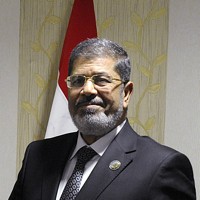Writing 10 years ago in Orbis magazine (.pdf), Ray Takeyh and I argued that, if a wave of democratization were to topple formerly pro-American autocrats in the Middle East, the new Arab democracies “would seek what they perceived to be equitable and fair relations with the United States, but object to . . . cumbersome American . . . demands, especially regarding Israel.” The speech delivered this week by Egypt’s first democratically elected president, Mohamed Morsi, at the United Nations General Assembly has confirmed this analysis.
Unlike Iranian President Mahmoud Ahmadinejad, whose pronouncements before the international community regularly conform to the expected stereotypes of an Islamist-inspired leader, Morsi made no sweeping denunciations of Western civilization, nor did he endorse the outright expulsion of the United States from the region. Since taking office, he has not taken any steps to abrogate the 1978 Camp David accords that produced a tenuous “cold peace” between Israel and Egypt. Nor is he hampering ongoing security cooperation with Washington. To the contrary, in an interview with the New York Times before the U.N. General Assembly, Morsi reiterated his view that Egypt and the United States can be “real friends.”
However, Morsi has also shown a streak of independence that has been met with concern, if not alarm, by a Washington establishment eager to learn whether the old U.S.-Egyptian relationship, forged with the previous autocratic leaders Anwar Sadat and Hosni Mubarak, will continue. Morsi traveled to Tehran earlier this summer to take part in the meeting of the Non-Aligned Movement, despite U.S. efforts to increase Iran’s diplomatic isolation. Morsi has also opened a diplomatic dialogue with Tehran that his predecessors had eschewed, and in his U.N. address, Morsi reiterated his position that Iran has a “right to nuclear energy,” again putting him at odds with American preferences. Similarly, his call for a regional group of states, including not only Turkey and Saudi Arabia, but also Iran -- a steadfast ally of embattled Syrian President Bashar al-Assad -- to mediate a stable transfer of power in Damascus is at odds with America’s preferred outcome of having Iranian influence in the region reduced altogether. Moreover, Morsi’s clear statement this past week in New York of his government’s full support for Palestinian efforts to gain U.N. recognition represents a shift from Mubarak’s unwillingness to cross the United States on this issue.

